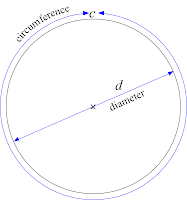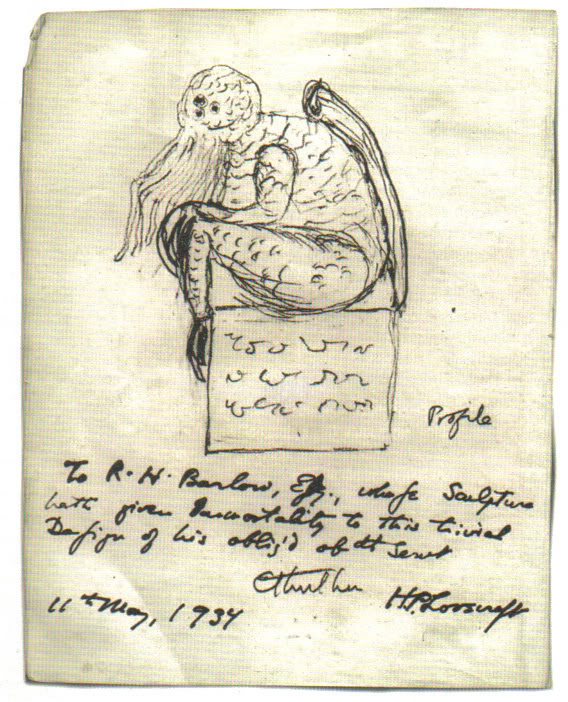I've posted a couple of past columns concluding that humans,
ultimately, are not as rational as we like to think ourselves to be. What we are, I believe, is pattern seekers,
and that's the basis of intuition. You
suddenly realize that one thing is like another--like Newton's realization that
the falling apple and the earth's moon were bound by the same force, or Philo
Farnsworth's inspiration for television from watching a till in the soil. It's a sudden insight, an epiphany. And fundamentally, it's irrational.
But that brings me to another kind of
irrationality: irrational numbers. Belatedly, I learned that March 14 is known as
π day. π, the lower case Greek letter pi, is equal to 3.14159265359…, and
March 14 or 3/14 which is an estimate of π to two decimal places has been
designated Pi Day.
π is an irrational number. It just goes on without repeating for ever
and ever.
There are lots of irrational numbers. As a matter of fact there is a famous,
elegant proof by mathematician Georg Cantor showing that the set of irrational
numbers is larger than the set of rational numbers. That's a lot of irrational
numbers considering there are an infinite number of rational numbers. Cantor showed there are different sizes of infinity.
But that's another Mindfingers post.
π is perhaps the most famous example of an
irrational number, and almost certainly the first one practically used. π is simply the number of times a diameter
goes into the circumference of a circle.
That is, if you took the diameter, D, in the circle below and wrapped it
around the Circumference, C, it would go just over three times—π times to be
exact.
Circles, of course, are
important, now as in antiquity. The moon
is a circle. The wheel is a circle. π was the magic number that would turn
straight lines into circles. It was
known back as far as the Babylonians and Ancient Egyptians.
Despite the fact that π has been proved to
be an irrational number, this hasn’t stopped people from trying to patterns
within it. It has been expanded to around ten trillion decimal places, last I
checked. People are forever counting how
many 5's there are, or where certain combinations of numbers appear. There are oodles of “sacred geometry” websites professing spiritual revelation out of the understanding of π and
other important irrational numbers.
Of
course, since π just keeps going, it does have the exact phone numbers,
consecutively and in alphabetical order, of everyone who has read this post.
But in fact, π is not without pattern. If it's
written in its decimal format, it looks that way, but there are other ways to write
numbers. As an infinite series for
example:
Looking at that, π appears quite elegant
actually. It's an accurate
representation of π, but it's not very efficient. To get π to 10 measly decimal places, you'd
have to expand that series to 5 billion terms.
There are other infinite series that converge on π much more quickly, but they
lack elegance of the above. This one converges
very quickly, but isn't quite as nice to look at:
 |
| Messy. Looks impressive though, right? And it's hypogeometric. That sounds important! |
The above mess was the work of Srinivasa
Ramanujan, a self-schooled brilliant mathematician from one of the poorest parts
of India in the late-19th / early-20th century who, with
practically no formal training in mathematics, wrote to Cambridge professor of
mathematics G.H. Hardy about his work on infinite series and continued
fractions. Hardy, after reading the unsolicited work Ramanujan, was completely
out of his depth. He famously said that
the theorems in Ramanujan's treatise "must be true, because, if they were
not true, no one would have the imagination to invent them." Ramanujan went on to a storied tenure at Cambridge University and made phenomenal
contributions to mathematics. He died at
32, probably in no small part due to chronic malnutrition and disease as a
youngster.
pic of Ramanaujan.
 |
| Srinivasa Ramanujan: "An equation for me has no meaning, unless it represents a thought of God." |
Another way of articulate a number is
through continuing fractions, where π can be represented as:
These numbers, like humans, may be
irrational, but they certainly aren't unintuitive. They have patterns that can't be seen in a
simple decimal expansion. The patterns
can only be seen when you include infinity--such as infinite series or
continued fractions. Rather pretty
patterns, and restoring my faith in the underlying elegance of the
universe.
Without getting too geeky (I know, I
know--too late), one of the most beautiful equations in mathematics is known as
Euler's Identity. I've even seen a tattoo of it.
Here, e
is the natural exponent. If you've ever
done much work on growth of bacteria, half-life of radiation, or compound
interest, you may have come across it.
It's the "base unit" if you will, of exponential growth or
decay. And, like π, it's
irrational. 2.718281828...
The term i is the square root of -1. But, of course, negative numbers can't have
square roots which is why i stands
for "imaginary number."
So you take one irrational number, e, take it to the power of another
irrational number, π, times the imaginary square root of negative one, subtract
1 (known as "the multiplicative identity" in mathematics) and you get
0 (known as "the additive identity" in mathematics). It ties together a number of disparate
mathematical terms and concepts in an equation of breathtaking eloquence and
simplicity.
Let's close off with a little brain
teaser. What's the solution to the
infinite series below. Answer next time.

















